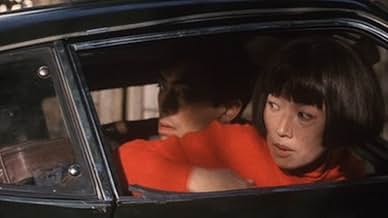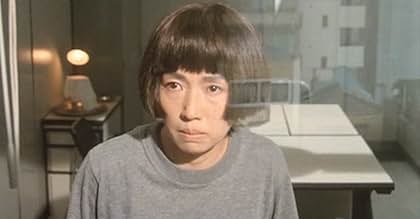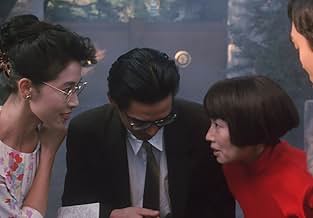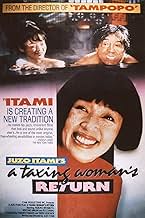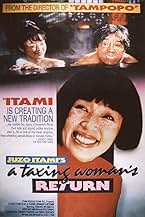AVALIAÇÃO DA IMDb
6,7/10
752
SUA AVALIAÇÃO
Adicionar um enredo no seu idiomaRyoko Itakura returns as the government tax agent willing to tackle the toughest cases. This time she takes on a fanatical but lucrative religious cult run by a vile lecher.Ryoko Itakura returns as the government tax agent willing to tackle the toughest cases. This time she takes on a fanatical but lucrative religious cult run by a vile lecher.Ryoko Itakura returns as the government tax agent willing to tackle the toughest cases. This time she takes on a fanatical but lucrative religious cult run by a vile lecher.
- Prêmios
- 2 vitórias e 4 indicações no total
Avaliações em destaque
Juzo Itami's sequel to his popular 1988 comedy has energy to spare, but there's more than a hint of redundancy in the further adventures of his intrepid, freckle-faced tax agent and her one-woman war against corporate greed. The new film is even more exaggerated than its predecessor, with enough sex, skullduggery, intrigue, and action to fuel any three James Bond thrillers, but as with most sequels the novelty is gone, and the scenario is desperately over-plotted (to say the least). Contrary to the film's title the heroine herself doesn't even return until well into the second half-hour, and then in a more limited role. What made the character so appealing in the original was her resemblance to a pint-sized Popeye Doyle (with most of the same obsessions), but here's she's reduced to being just another cog in a very stylish, very busy machine, running more or less on autopilot.
This sequel to the Taxing Woman takes on the corruption of politician, religious organization, and yakuza.
Ryoko (Nobuko Miyamoto) is on to a case concerning religious organization, and gangs concerning Jiageya ( A group of gangs who buys homes by using violent means so that real estate can be rebuilt and sold for a profit ). The case eventually leads to corrupt politicians. Ryoko enters the religious organization in question as its member, and finds out that its headquarter has a hidden room containing evidence of corruption.
The movie takes into account many topics that was suspected of being the case in society back in the '80s Japan. Itami connected the dots taking artistic license and turned it into a movie.
This movie is more entertaining than the first Marusa No Onna. The corruption is on a bigger scale, and investigation is more sophisticated.
This is one of the most entertaining movie by director Itami, and is recommended for viewing.
Ryoko (Nobuko Miyamoto) is on to a case concerning religious organization, and gangs concerning Jiageya ( A group of gangs who buys homes by using violent means so that real estate can be rebuilt and sold for a profit ). The case eventually leads to corrupt politicians. Ryoko enters the religious organization in question as its member, and finds out that its headquarter has a hidden room containing evidence of corruption.
The movie takes into account many topics that was suspected of being the case in society back in the '80s Japan. Itami connected the dots taking artistic license and turned it into a movie.
This movie is more entertaining than the first Marusa No Onna. The corruption is on a bigger scale, and investigation is more sophisticated.
This is one of the most entertaining movie by director Itami, and is recommended for viewing.
This sequel to the original is about the tax inspectors in Tokyo trying to find hidden money amongst a religious group, which at the time, in the age of Jim Bakker and Jimmy Swaggert, was a very topical subject. Nobuko Miyamoto is back as Ryoko, but she is more just one in an ensemble piece rather than a big star of the film. Still, she is a great character and great fun to watch. This film has more action than the first, but it is also a little confusing. You get a major peek inside what seems like a religious cult and you see the world of greed at your doorstep. If you saw the original, which was better since it had more Ryoko, you'll want to see this also. Its a worthy follow up and its a shame there weren't more films on the subject. I saw the two films within a few days of each other and I enjoyed them. I think you will too.
I am a big fan of Nobuko Miyamoto and her work with her husband, Juzo Itami, in such films as "Minbo" and the first "Taxing Woman" but this film dissappoints. It starts out with a great setup, a religious cult is involved with yakuza real estate dealings, but the payoff is unsatisfying. The money is difficult to keep straight, ie. who payed what to whom, and in the end I wasn't sure if the bad guys had been punished or not. Some fine moments with Miyamoto but in the end it was very forgettable.
"A Taxing Woman's Return" seems like a strange title for a movie, but somehow Juzo Itami makes Japanese tax investigation quite entertaining and interesting. The film has a carefully constructed, intricate plot and well-written screenplay; good acting and a *wonderfully* caustic sense of humor make this movie hilariously entertaining. Some of the best moments, though, come from showing how the fraudulent religious cult works (in evicting stubborn tenants, for example), and from Itami's gradual peeling away of plot layers to give us a peek at the never ending corruption in the system. This movie sits comfortably in my favorite 20 films.
Você sabia?
- ConexõesFeatured in Marusa no onnna 2 wo marusa suru (1988)
Principais escolhas
Faça login para avaliar e ver a lista de recomendações personalizadas
Detalhes
- Data de lançamento
- País de origem
- Idioma
- Também conhecido como
- A Taxing Woman's Return
- Empresa de produção
- Consulte mais créditos da empresa na IMDbPro
Bilheteria
- Faturamento bruto nos EUA e Canadá
- US$ 333.584
- Tempo de duração2 horas 7 minutos
- Cor
- Mixagem de som
- Proporção
- 1.37 : 1
Contribua para esta página
Sugerir uma alteração ou adicionar conteúdo ausente

Principal brecha
By what name was A Volta da Coletora de Impostos (1988) officially released in India in English?
Responda
